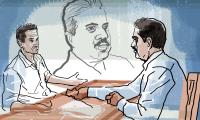Although US Secretary of State Colin Powell unabashedly keeps claiming credit for being the catalyst in resurrecting the India-Pakistan dialogue that began with former Prime Minister Atal Bihari Vajpayee extending an olive branch to President Pervez Musharraf, it was former US President Bill Clinton who was the facilitator, says former Deputy Secretary of State Strobe Talbott.
Talbott, in his soon to be released book, Engaging India: Diplomacy, Democracy and the Bomb, concedes that in 2003, the Bush Administration--especially, Powell, Deputy Secretary of State Richard Armitage and Assistant Secretary of State Christina Rocca--"worked quietly behind the scene to nudge India and Pakistan toward a revival of the peace process."
But, he points out, "Bill Clinton chipped in as well. Shortly after leaving office, with encouragement from Vajpayee, he had established a foundation to raise money, largely from the Indian Americans, for reconstructing schools and hospitals in villages devastated by an earthquake that had struck Gujarat in January 2001. That project took Clinton to India three months later and kept him in close touch with events and contacts in South Asia over the next two and a half years.
"During a period of heightened tension between India and Pakistan in early 2003, Clinton received a phone call from Musharraf asking for help in restarting discussions with Vajpayee. Clinton replied that he would not be party to any such approach unless he was certain Musharraf recognized that a demand for India to give up Kashmir could not be a part of the deal. Musharraf said he would be back in touch.Clinton heard nothing more from him for nearly nine months."
"In November 2003, Clinton visited New Delhi again, this time in connection with another of his postpresidency ventures, an initiative to combat HIV/AIDS by making treatment more affordable in developing countries."
Talbott discloses that "in a private meeting, Vajpayee cautiously raised the possibility of resuming talks with Musharraf. When Clinton told him about the call he had received from the Pakistani leader earlier in the year, Vajpayee asked him to phone Musharraf and convery a simple message:Vajpayee was determined, if possible, to remove once and for all the "burden" that the India-Pakistan dispute imposed on both countries;he was prepared to reopen a channel to Islamabad without advance commitments on either side, but only if he was confident he would not be embarrassed as he had been after Lahore."
"In delivering that message to Musharraf," Talbott writes, "Clinton stressed that Vajpayee's political standing in India and his willingness to venture again down what had already been a treacherous road made him the best hope; Pakistan should seize the opportunity, since it might not have another one for a long time to come.
"Two days after Clinton's trip, India and Pakistan announced they had agreed to a ceasefire along the the Line of Control.The talks led to a resumption of overflight rights and air links that had been suspended in the wake of the attack on the Indian parliament two years before.
"The first week in January 2004, Vajpayee and Musharraf met in Islamabad on the margins of a regional leaders' summit. Vajpayee agreed to talk on all issues, including Kashmir, and Musharraf pledged in writing to end Pakistani support of Kashmiri militants."
And "in mid-February, India and Pakistan agreed on a six-month 'roadmap to peace,'which would, if pursued, address all outstanding issues, including the nuclear one."







